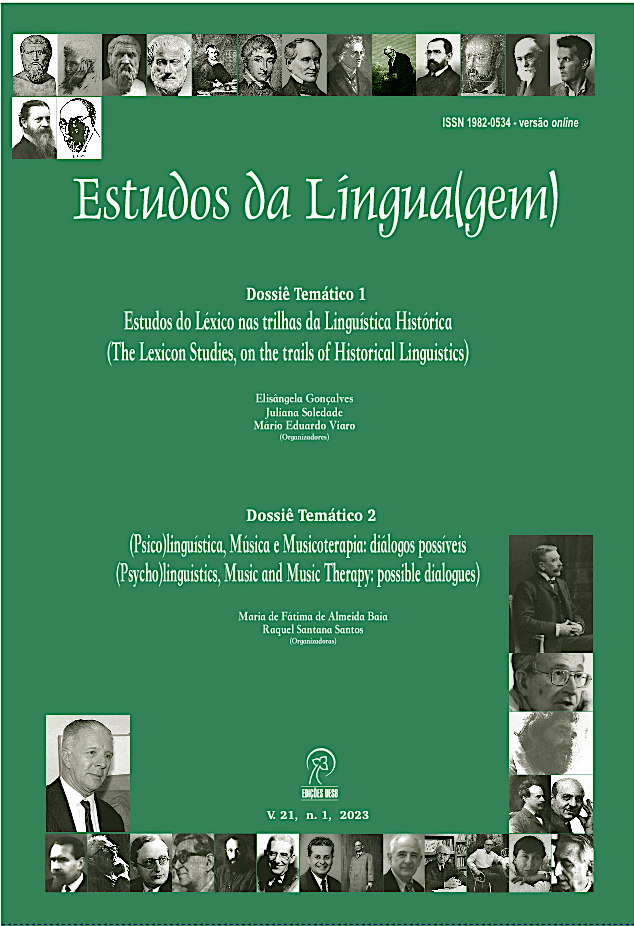Interdisciplinarity in the toponymy studies: the contribution of dick’s taxonomic model (1980, 1990)
DOI:
https://doi.org/10.22481/el.v21i1.10199Abstract
Toponymy is a major area of interest within the field of Onomastics that has proper place names as an object of study, aside from being part of Linguistics. Toponymy studies, introduced as a discipline in France in 1878 by Longnon (DICK, 1990), only came to Brazil years later due to the academic studies made by Levy Cardoso. Toponymy was systematized as an academic discipline by Carlos Drumond (1965) and, afterward, by Dick (1980), who was responsible to initiate the process of systematization concerning toponymy research methodologies in Brazil. Consequently, Dick became the greatest precursor of the epistemology related to Brazilian Toponymy, considering its specificities. Moreover, Dick classified these studies as part of the academic disciplines of a degree in languages at the University of São Paulo (USP). That being said, this bibliographic article aims to discuss the interdisciplinary property of the taxonomic model made by Dick (1980) as a methodology for the work with Toponymy. For that purpose, we briefly study the concept of interdisciplinarity (FAZENDA, 1996; FERREIRA, 1996; POMBO, 2008; MORIN, 2011) and also present the proposal stated by Dick (1980, 1990), considering its interdisciplinary features. Finally, this study has identified that the interdisciplinary vision of researchers should be clear to accomplish a complete analysis of the motivations about Toponymy, considering the variety of knowledge areas.
Downloads
References
DEMO, P. Complexidade e aprendizagem: a dinâmica não Linear do conhecimento. São Paulo: Editora Atlas, 2002.
DICK, M. V. P. A. A motivação toponímica. Princípios teóricos e modelos taxionômicos. Tese (Doutorado em Semiótica e Linguística Geral) – Programa de Pós-Graduação em Semiótica e Linguística Geral, Universidade de São Paulo, FFLCH-USP, 1980.
______. M. V. P. A. Toponímia e antroponímia no Brasil: coletânea de estudos. São Paulo: acervo FFLCH-L3, 1990.
FAZENDA, I. (org.). Práticas interdisciplinares na escola. 3. ed. São Paulo: Cortez, 1996.
FERREIRA, M. E. M. P. Ciência e interdisciplinaridade. In: FAZENDA, ivani (org.). Práticas interdisciplinares na escola. 3. ed. São Paulo: Cortez, 1996.
FRANCISQUINI, I. A. O nome do lugar: uma proposta de estudos toponímicos da microrregião de Paranaval. 1998. 255 f. Dissertação (Mestrado em Letras) – Universidade Estadual de Londrina, Londrina, PR, 1998.
IRINEU, L. M.; ARAÚJO, J. Interfaces em pesquisas em Linguística Aplicada: as epistemologias em estudos sobre linguagem e tecnologia no PPGL/UFC e no POSLA/UECE. In: LIMA, A. H. V.; PITA, J. R.; SOARES, M. E. A Linguística na teoria e na prática. São Paulo: Pimenta Cultural, 2020.
JAPIASSU, H. O sonho transdisciplinar. Revista Desafios, v. 3, n.1, p. 3-9, set., 2016.
MACLAREN, P. Prefácio. In: PELLANDA, N. M. C.; BOETTCHER, D. M.; PINTO, Maira Meira (orgs.). Viver/Conhecer na perspectiva da complexidade: experiências de pesquisa. Santa Cruz do Sul: EDUNISC, 2017.
MARIN, A. J. Educação continuada: sair do informalismo? In: CONGRESSO ESTADUAL PAULISTA SOBRE FORMAÇÃO DE EDUCADORES, 1, 1990. Águas de São Pedro. Anais... São Paulo: Unesp, 1990. p.114-118.
MORIN, E. Os sete saberes necessários à educação do futuro. 2 ed. rev. São Paulo: Cortez, 2011.
POMBO, O. Epistemologia da interdisciplinaridade. Revista do Centro de Educação e Letras, Foz do Iguaçu, v. 10, n. 1, p. 9-40, jan./jun., 2008.
RAJAGOPALAN, K. Por uma linguística crítica: linguagem,identidade e questão ética. São Paulo: Parábola, 2003.
SEGURA, S. J. La onomástica como rama interdisciplinaria de la lingüística, ¿propuesta “unidisciplinaria” ? Onomástica Desde América Latina, n.4, v.2, jul./dez., 2021, p.147-175. Disponível em: <https://e-revista.unioeste.br/index.php/onomastica/article/view/27527/pdf>. Acesso em 16 set. 2021.
SOUSA, A. M. Desbravando a Amazônia ocidental: estudo toponímico de acidentes geográficos humanos e físicos do Acre. 2007. 122 f. Tese (Doutorado em Linguística) – Programa de Pós-Graduação em Linguística. Universidade Federal do Ceará, Fortaleza, 2007.
Downloads
Published
How to Cite
Issue
Section
License
Copyright (c) 2023 Language Studies

This work is licensed under a Creative Commons Attribution 4.0 International License.

Estudos da Língua(gem) is licensed under a Creative Commons Attribution 4.0 International License.
Authors who publish in the journal Estudos da Língua (gem) agree with the following terms:
The journal Estudos de Língua(gem) maintains the copyrights of the contributions published. These rights include the publication of the contribution and make its content available for free through the portal.







